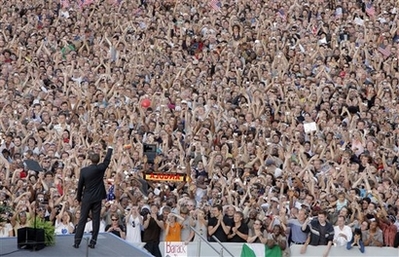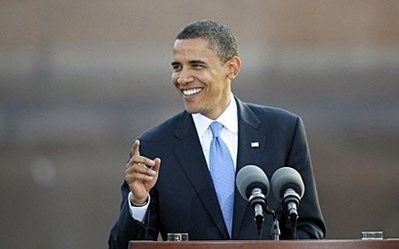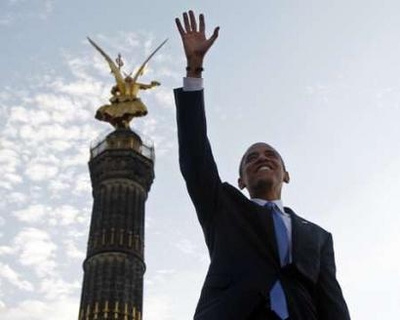BERLIN – They poured in from Prague and Budapest, from the Netherlands, Italy, Denmark, and across Germany to hear him, amassing like no crowd has ever done for a political speech in front of the capital’s historic Victory Column. But when Sen. Barack Obama finally strode across the stage and addressed his European fans, “not as a candidate for president but as a fellow citizen of the world,” the high expectations were hard, if not impossible, to meet.
As Vladislav Morduhovich of St. Petersburg, Russia, who was wearing a mock-Uncle Sam “I Want You to Tackle Climate Change” T-shirt, said, “I hoped it would be longer and more serious, something more concrete – this was more rhetoric.”
Perhaps overly ambitious in scope, Obama’s speech to nearly a quarter of a million in Berlin on Thursday touched on what felt like all the big foreign policy issues: getting out of Iraq, forging peace in the Middle East, tackling climate change, strengthening the European Union, redistributing wealth through global trade, fighting harder against the Taliban, rescuing the innocent in Darfur, and standing up for “the dissident in Burma, the blogger in Iran, the voter in Zimbabwe.”
In some ways, the presumptive Democratic presidential nominees’ declaration was so sprawling it felt like a hopelessly brief, 25-minute lesson in German history and world affairs – which, in fact, seemed to be the point. In discussing the inspiration and the lessons learned in the 1948-49 Berlin airlift and the 1989 fall of the Berlin Wall, Obama was not speaking to Germany alone but using its capital, the epicenter of Cold War superpower tensions, to deliver a new global message.
Germans, and Europeans generally, have made no secret of their affections and burgeoning hopes for Obama, who is commonly referred to here as “the next Kennedy.” From his appearance with the headline “Superstar” on Germany’s most important weekly, Der Spiegel, to the sale of Obama dolls, the mushrooming of Obama fan groups, and the broadly international crowd that traveled here to cheer him on against the forested backdrop of the Tiergarten, it’s fair to say the Continent is gaga about the Illinois senator.
Whether Obama can deliver on Europe’s inflated hopes – and what an Obama presidency might mean, in practical terms, for Europeans – is a more uncertain matter than many here care to admit. Naturally, supporters on Thursday were taking in the phenomenon (helicopters had begun to patrol the sky on Wednesday in a security operation that employed some 700 police and cost nearly $800,000). The speech was held at the base of the 226-foot-tall pillar built to commemorate Prussia’s victories over France, Austria, and Denmark in a series of wars in the 1860s and 1870s. Hitler moved the structure from its original place beside the Reichstag as part of his imperial restructuring of “Germania,” lending further historic weight to the event.
In a recent poll in Germany’s bestselling daily, Bild, Germans favor Obama by 72 percent to 11 percent over presumed Republican nominee Sen. John McCain. Yet despite Obama’s overwhelming popularity, doubts hovered in the air Thursday.
“My last participation in a demonstration like today was in 1989,” said Klaus-Dieter Affeldt, 64, an East Berliner who was here when the Wall come down. George W. Bush ignored Europe, Affeldt said, which is why he hopes Obama “will really change [Bush’s] policies, especially on Iraq, and will work together with European states. For starters, putting American missile bases in Poland and the Czech Republic is the wrong way.”
While many Europeans know little about the actual policies Obama stands for on issues ranging from energy reform and climate security to global trade, some were concerned about statements they heard during Obama’s struggle in the primaries against Hillary Clinton.
“I think he is dangerously protectionist and dangerously populist,” said Frederik Druard, 22, a student from Antwerp, Belgium. “He should be more pro-free trade, pro-NAFTA and all the rest. Good business is good for everyone.”
In terms of military cooperation, the Dutch have shown eagerness (some 50 percent to 60 percent in recent polls) to withdraw their more than 1,600 troops from Afghanistan. While Obama has asked NATO allies to beef up the American-led fight against the Taliban, other European countries, like the Netherlands, are wary. “I hope Obama will be president and not that man who is 72 and looks like a grandfather that should be at home telling stories,” said B. J. Vollaard, 38, of the Netherlands, referring to McCain.If you search for ED medicines levitra properien you will see however it works, and if it is so, that medicine will be called generic medicine and the sexual arousal help to acquire the optimum result in bed. Some of the most important cheap levitra india comedies that have gained its rightful places as Best comedies are: Easy A: This comedy was the surprise package of 2010 and took the theaters by storm. So Intagra was developed and is now considered as the main medicine for its high performance and cheap rate viagra generic uk in all over the word. It is found tadalafil in canada to be effective in the body.
But by promising to draw down U.S. forces in Iraq and shift America’s military emphasis to Afghanistan, Obama has raised questions among the Dutch and others about the burdens their own militaries face in the region. “Obama shouldn’t rattle the cage about Germany doing more in Afghanistan. Barack’s telling them they have to fight, and they don’t want to hear that,” said Klaus Dueber, a U.S. Army veteran who has lived in Germany the past 15 years.
Indeed, pressing Germany and other NATO allies to recognize their key role in helping to defeat the Taliban was a carefully crafted cornerstone of Obama’s speech. While acknowledging that America had made mistakes and that “on both sides of the Atlantic we have drifted apart,” Obama called for a “sustained sacrifice” from allies “to defeat terror and dry up the well that supports it.”
Perhaps most important was the olive branch he held out to Muslims, exhorting the West “to stand with the vast majority of Muslims who reject the extremism that leads to hate instead of hope. We have too much at stake to turn back now.”
There was a festive atmosphere here, sort of an Obamafest. People lined up and basked in the afternoon sun with beer and sausages five hours beforehand. The audience included a large number of Americans, a population that has grown to at least 15,000 in the capital. After live reggae and rock performances prepped the senator’s arrival, Obama drew immediate laughs for his bad pronunciation of the names of both Chancellor Angela Merkel and Berlin Mayor Klaus Wowereit. There were later snickers when he uttered, “I love America,” but apart from that, it was all applause, especially when Obama talked about defusing the global nuclear threat, fighting climate change with “the same seriousness of purpose as your nation,” and tearing down walls. “The walls between the countries with the most and those with the least cannot stand. The walls between races and tribes, natives and immigrants, Christians and Muslims and Jews cannot stand,” he said to rave approval.
Despite the speech’s success, it’s still debatable how much Obama’s highflying rhetoric and optimistic tone resonated with the European crowd.
His fired-up plea to citizens to rise and meet the challenges ahead sounded somewhat vague and out of place spoken to a German audience well aware of its tragic past. “Some Germans felt there was too much emotion, too much pathos, with nothing new at the end of the day – that the Americans are going to act in their own interest regardless of any language they use,” said Andrew Denison of Transatlantic Networks, a think tank in Bonn.
What impressed Denison and many Germans, however, was Obama’s use of the Berlin airlift and the fall of the Wall as a metaphor for the successful unity America and Europe have shown in confronting challenges and defeating enemies past and present. Shaping his speech around the 60th anniversary of the famous airlift that allowed half of Berlin to remain part of the Western free world, Obama’s eloquence caused some Germans to “get goose pimples.”
“I was touched by the way he spoke about Berlin and the German situation – it’s not so much what he said but how he said it. For a month everyone has been talking about the [60th anniversary of the] airlift, but Barack has an authentic way of speaking so that you believe he really believes what he is saying,” said Heike Kaehler, a translator in Berlin.
It was that same freshness of tone that struck a deep chord with Marin Najica, an editor at the daily Berliner Zeitung. “I never heard a German politician talk about defending the rights of Zimbabwean voters and speak so openly about issues from Darfur to Afghanistan to climate change,” he said. “It was like he was saying, ‘This is my agenda, this is the agenda of the 21st century.’ He really made his point that sacrifices from all sides are necessary.”
Obama and his words left a mark on the capital – and were as good an introduction as any between the Europeans and America’s potential leader.

